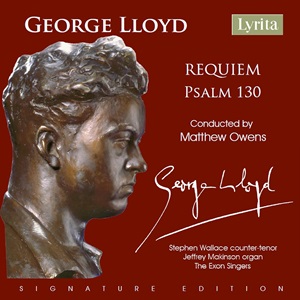
George Lloyd (1913-1998)
Requiem (1998)
Psalm 130 (1995)
Stephen Wallace (counter-tenor); Jeffrey Makinson (organ)
The Exon Singers/Matthew Owens
rec. 2000, St. Alban the Martyr, Holborn, London
Sung texts and Latin to English translations provided
Lyrita SRCD420 [59]
The Lyrita website announces an agreement with the George Lloyd Society granting access to the composer’s scores and ‘commercial exploitation’ of those recordings made by the Society and which were issued on the Albany label. This news will delight Lloyd’s many admirers. Three Lyrita issues of the planned complete ‘Signature Edition’ have already been reviewed on MusicWeb International (review ~ review ~ review), and here now is a pairing of two important choral works.
In the weeks that followed the death of Diana, Princess of Wales, in Paris on 31 August 1997, George Lloyd began work on the Requiem recorded here. He completed it in May of the following year and dedicated it to Diana’s memory. It was to be his final work, as Lloyd himself died on 3 July 1998. It was first performed in Oxford in April 2000 by the same choir, organist and conductor as on this recording. In broad terms it is a Requiem along the lines of those by Fauré or Duruflé rather than Verdi or Berlioz. The text is that of the Latin Mass for the Dead, with nothing added, secular or otherwise. It is scored for counter-tenor, choir and organ. In this performance, it runs for a little over 50 minutes. Much of the work is calm and consolatory, though passages such as Dies irae and the Hosannas in the Sanctus necessitate a different approach, a challenge to which the composer responded with great skill. The Sanctus itself is, quite simply, joyful, and another refreshing passage is the vivacious Hostias. Paul Conway’s excellent booklet note, apparently written for this reissue, suggests that this passage might be seen as the composer’s ‘musical self-portrait’. It is certainly an unusual and engaging response to the text. Many particularly lovely moments abound throughout the work. Most listeners will find the beginning of the Liber scriptus, for example, involving the upper voices only, particularly attractive. Lloyd’s music is, as always, firmly anchored within a tonal idiom: ‘I just write what I have to write’, he said. There is little in the way of counterpoint – you will listen in vain for a fugue – but devices such as imitation are used widely, and ensure that the choral writing is varied and consistently interesting.
Conway also informs us that Lloyd chose modest forces because his declining health made constructing and managing a large-scale score difficult. There are places, he feels, where some listeners might regret the absence of an orchestra. I can understand the reasoning, but I find that the music so perfectly suited to the forces that nothing is really missing. The most unusual feature of the line-up is the use of a counter-tenor soloist. Any idea that Lloyd might have been aiming for something neo-baroque can be discounted. Firstly, and most unusually, the solo part is written almost exclusively in the lower register. A tenor could sing the notes, and would be very much in his comfort zone. For a counter-tenor the music presents different challenges, and the solo writing therefore has a very particular quality to it. Stephen Wallace is outstanding, the voice itself extremely beautiful and the singing most sensitive and responsive to the words. The listener looks forward to his appearances with pleasure. Jeffrey Makinson, too, makes the most of Lloyd’s highly resourceful organ writing. The brilliant introduction to the Dies irae is a fine example of this. I have not seen the score, but the choral writing sounds like something a good amateur choir could master and would certainly enjoy. But its apparent simplicity does not in any way diminish the remarkable quality of the Exon Singers here. By their variety of colour, attack and expressivity, these singers bring something extra to music that could, quite easily, have become rather monochrome. Matthew Owens’s credentials are well known – he has passed through a number of prestigious posts – and he delivers here a perfectly judged and loving performance.
Owens’s father was an admirer of the music of George Lloyd, and he commissioned the composer to write the companion work on this disc, a setting of Psalm 130. It is written for unaccompanied choir and Owens directed its first performance in 1996. The choral writing allows the words to be clearly heard, an important consideration with a text such as this one. The choir is frequently used in small groups that exchange and respond to each other. There are a number of short interventions from a solo soprano that are so gorgeously taken that listeners would have been happy to know her name. The Psalm closes in an atmosphere of tranquillity and hope, rather as does the Requiem. Most listeners will be able to set aside questions about the employment of so traditional musical language and simply allow themselves to wallow in the lovely sounds this music makes and the beautiful sentiments it communicates.
William Hedley
Buying this recording via a link below generates revenue for MWI and helps us keep free access to the site




















